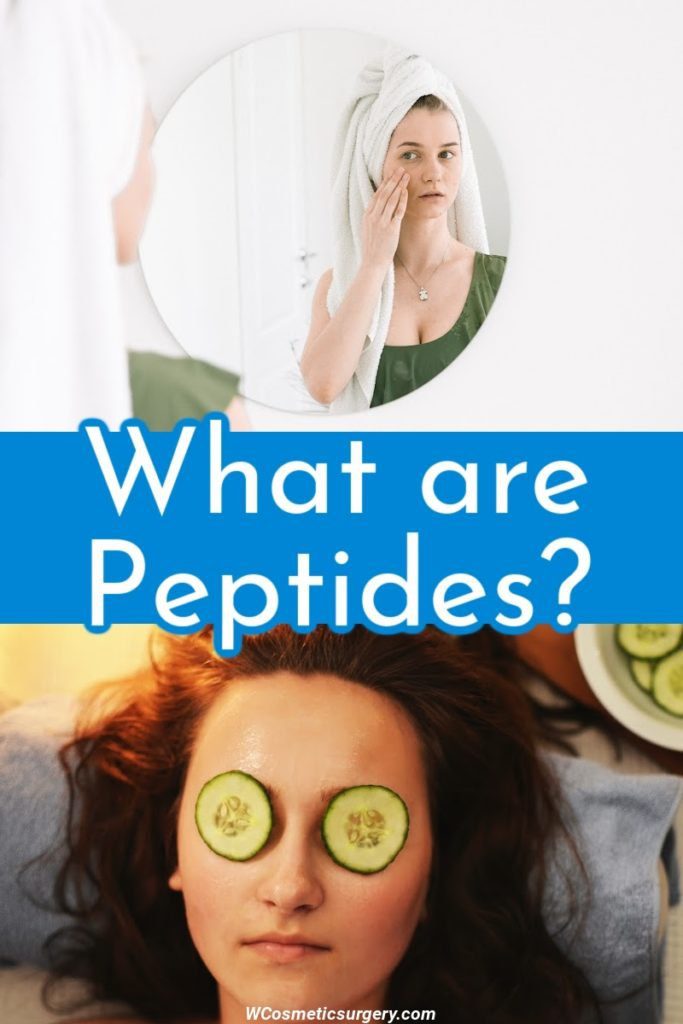
There are different types of peptides. Peptides are strings of amino acids that are produced by the body and are considered the “building blocks” of protein. What are peptides as it pertains to skincare? We must take a look at the different types of peptides to discover how they can be used for skincare and possibly antiaging.
Finding out what are peptides is an effective way to deepen your understanding of skincare and how you can improve your skin to reverse the side effects of aging. Signal peptides alert cells to produce more collagen and elastin. Collagen is depleted or lost as we age and also lost in the course of skin injury.

They actually trick the skin into thinking it’s been injured, triggering the production of repair proteins such as collagen and elastin by the cellular production factories, the dermal fibroblasts. Carrier peptides help deliver substances to cells. Neurotransmitter peptides inhibit the release of acetylcholine, preventing the contraction of muscle, for example, and in that way work similarly to Botox to soften the fine lines created by muscle movement.

What Peptides are Useful
Peptides either can be found in plants or can be synthesized in a lab. Most of these amino acid strings used in skin care are small. They are labeled by the number of strings actually found in the product: tripeptides, pentapeptides, hexapeptides, etc. In total, products with less than 50 peptides are called nano peptides.
Larger strings may also be useful. They may enter through the larger pores in the skin and the glands and hair, hair follicles, sweat glands. They can also be forced into the skin by wounding the skin and destroying its natural barriers, for example, after microneedling or laser resurfacing.
They can be linked to copper peptides in certain formulations to produce potentially greater benefits. These strings can also be combined with other compounds such as vitamin C or retinoic acid or hyaluronic acids – the peptides may aid in the penetration of these other compounds, or the compounds may act synergistically.
Matrikines are peptides created by the digestion of molecules of the extracellular matrix and are found in many products available on the market.

Where to Find Them
These are several products that aesthetic skin care specialists recommend and that we carry in our office. The supplements listed below have scientific studies that validate their use, some done in the lab and others in studies on actual live patients.
We believe that these products are beneficial supplements to a Retin-A, alpha hydroxy acid, and vitamin C serum skin care regimen. Some products commercially available also have these supplements in their formulations, so it is best to consult with us prior to purchasing them either in our office, online, or at Sephora.
Alone, we remain uncertain of whether peptides produce the same benefit as the comprehensive regimen that we currently advocate.
- Copper Glycine–histidine–lysine tripeptide (GHK) has been shown to increase collagen in the skin over the course of a month’s treatment.
- Glycine–glutamate–lysine–glycine tetrapeptide (GEKG)
- GEKG, also known as tetrapeptide-21. Collectively, the results indicated improvements in the skin quality, lines, and wrinkles, along with increased procollagen production.
- Matrixyl®Lysine–threonine–threonine–lysine–serine pentapeptide (KTTKS)
- Micro-protein complex (MPC™; Merz North America, Inc., Raleigh, NC, USA)
- Below are several peptide-products that we carry in our office:
- Dermal Renewal Cream: Palmitoyl tetrapeptide-7, Oligopeptide-68, Acetyl hexapeptide-37
- Necklevate: Hexapeptide-1
- Hymed Healing and Renewing Serum: Oligopeptide, Palmitol tetrapeptide-7
- Oil-free Clarifying Moisturizer with Peptides) – Oligopeptide-10
- Hyaluronic Acid Peptide Gel – Palmitoyl tetrapeptide-7, Caprooyl tetrapeptide-3


